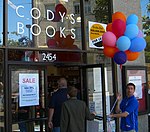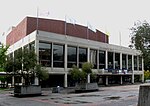Southside, Berkeley, California
Neighborhoods in Berkeley, CaliforniaStudent quartersUniversity of California, Berkeley

Southside, also known by the older names South of Campus or South Campus, is a neighborhood in Berkeley, California. Southside is located directly south of and adjacent to the University of California, Berkeley campus. Because of the large student presence in the neighborhood, proximity to Sproul Plaza, and history of the area, Southside is the neighborhood most closely associated with the university.
Excerpt from the Wikipedia article Southside, Berkeley, California (License: CC BY-SA 3.0, Authors, Images).Southside, Berkeley, California
Telegraph Avenue, Berkeley
Geographical coordinates (GPS) Address Phone number Website Nearby Places Show on map
Geographical coordinates (GPS)
| Latitude | Longitude |
|---|---|
| N 37.8678 ° | E -122.259 ° |
Address
Super Duper Burger
Telegraph Avenue 2355
94704 Berkeley
California, United States
Open on Google Maps








